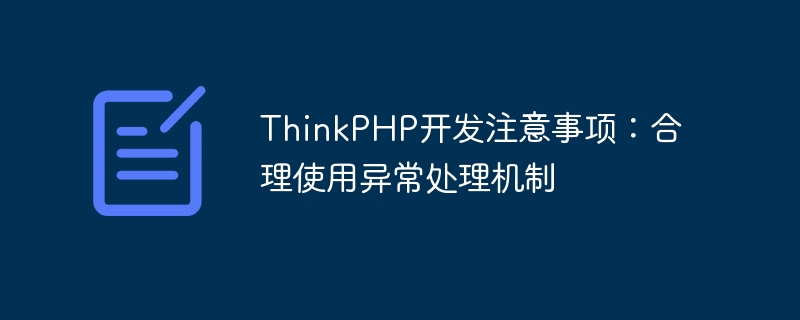Home >PHP Framework >ThinkPHP >Things to note when developing ThinkPHP: Proper use of exception handling mechanisms
Things to note when developing ThinkPHP: Proper use of exception handling mechanisms
- 王林Original
- 2023-11-22 18:14:121190browse

ThinkPHP is an extremely popular PHP framework. It provides us with many convenient functions, among which the exception handling mechanism is one of them. In software development, the exception handling mechanism is indispensable. It can help us find and solve problems in time and improve code quality. However, if the exception handling mechanism is not used rationally, it will cause some unpredictable problems. Therefore, this article will introduce some exception handling mechanisms that need to be paid attention to during the development of ThinkPHP. I hope it will be helpful to everyone.
- Exception usage scenarios
Before using the exception handling mechanism, we need to understand the exception usage scenarios. Generally speaking, exceptions are used to handle errors or unexpected problems that occur when a program is running. For example, when we write database operation code, we make some incorrect operations, such as inserting a non-numeric character into an INT type field, and an exception occurs in the program. Or when the program is running, the program cannot execute normally because the user inputs some incorrect data. At this time, we also need to use exceptions to catch errors.
In short, the function of the exception handling mechanism is to stop the execution of the program immediately when a problem occurs in the program and output the corresponding error message according to the specific situation. This can prevent unnecessary error proliferation and code pollution, and greatly improve the reliability of the code.
- Be careful to avoid abusing exceptions
During the development process, we need to avoid abusing the exception mechanism. Because the exception handling mechanism will bring certain performance losses, misuse of exceptions will lead to program performance degradation. Moreover, too many exception captures will make the code look very bloated, and the readability of the code will be greatly reduced. Therefore, we need to use exception handling mechanisms when appropriate.
- Custom exception classes
ThinkPHP has some built-in exception classes, such as TpException class and HttpException class. These built-in exception classes can meet our development needs in some cases, but in specific scenarios, we need to customize exception classes to better manage our business logic. For example, when developing an e-commerce website, we need to customize a GoodsException class to handle product-related exceptions, which is helpful for classifying and managing different business logic.
- More detailed exception handling
When handling exceptions, we need to pay attention to more detailed exception handling. Sometimes we need to output more detailed error information, or even write the error information to a log file so that technicians can track and maintain it in real time. At the same time, we also need to pay attention to data security and data confidentiality when outputting error information to ensure that sensitive data will not be leaked.
- The combination of exception handling and business logic
The combination of exception handling and business logic is very important. When handling exceptions, we need to pay special attention to the relevant processing of business logic. For example, when developing a forum system, if the number of posts by a user exceeds the maximum number of posts specified by the forum, we need to throw a corresponding exception and prompt the user that they can no longer post. At this time, we need to add business logic to the exception handling mechanism to ensure the correctness and integrity of the program.
In short, in ThinkPHP development, reasonable use of exception handling mechanism is one of the keys to ensuring program quality. We need to avoid the abuse of exceptions, customize exception classes, more detailed exception handling, and the combination of exception handling and business logic. Only in this way can we develop high-quality programs that meet the needs of users.
The above is the detailed content of Things to note when developing ThinkPHP: Proper use of exception handling mechanisms. For more information, please follow other related articles on the PHP Chinese website!

